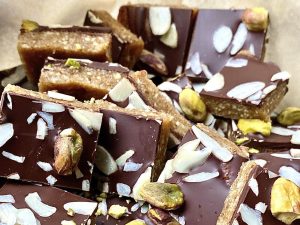Your Gut Health Could Be The Reason
Hello Everyone! It’s a fact that your gut health has an impact on your mental well-being, as well as your physical health. Feeling jolly has a lot to do with a gut abundant with a perfect balance of diverse intestinal microbiota (brain-gut connection).
The holidays can test your brain and gut health. Whatever holiday you celebrate in your corner of the world can be a period where food, alcohol, (and stress) are prominently present.
All these can lead to a gut microbiota imbalance, causing a pro-inflammatory state, which has adverse physical and mental health outcomes. These include low moods, brain fog, depression, and anxiety, as well as subsequently affecting neurotransmitter (e.g., feel-good serotonin) synthesis.
In this post, I will share tips on indulging in some microbiota-loving activities to look after or improve your gut health throughout the festive season.
How to Have a Gut-healthy Holiday Season
What Alcohol Is Best for Gut Health?
Festive Food to Keep Gut Healthy
Does Exercise Reduce Inflammation?
Can Holiday Stress Affect Gut Health?
Sleep and Gut Health
Looking After Your Gut Microbiome
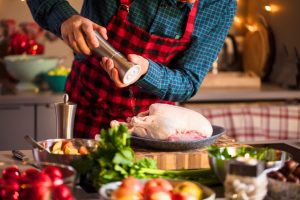
How to Have a Gut-healthy Holiday Season
Five tips that will contribute to your jolly time:
J Just be kind to yourself – and have alcohol in moderation. Because in large amounts, alcohol can overwhelm your gastrointestinal tract and liver.
O Opting for traditional holiday foods like meat and vegetables prepared simply will populate your microbiome with some excellent bacteria.
L Love yourself more and let your mind and body relax, breathe, meditate, and reduce stress. This is important for gut motility, liver health, digestion, and immunity.
L Limited body movements promote inflammation. Make sure that you fit in a little exercise every day. Gut microbiota doesn’t like sedentary lifestyles.
Y Yawning means that you are tired. Don’t fight sleep—alternate later nights with earlier nights. Sleep deprivation changes gut microbes.

What Alcohol Is Best for Gut Health?
I love a glass of champagne or some vintage wine, and I recommend a glass or two when at parties, with a glass of water in between. Not only to dilute it in your system but also to avoid dehydration. If you are at a dinner party, all the better because the food will slow the absorption of alcohol in the bloodstream.
Make sure that you don’t drink on an empty stomach.
A glass of red wine or champagne will have a beneficial effect on your gut microbes and increase diversity, which in turn will reduce inflammation.

This is mainly attributed to their rich and varied polyphenol content. Non-alcoholic red wine contains the same levels of polyphenols, too.
Polyphenols are antioxidants that can beneficially affect the gut microbiota. They also exert a protective effect on the brain, protecting from age-related neurological disorders and the cardiovascular system by lowering blood pressure.
If blood pressure is a concern, non-alcoholic red wine may be a better option. Go for an organic one. Check the ingredients.
If you are out for a drink with friends and feel like you will have more than one, I recommend a vodka soda because it isn’t loaded with sugar. Alternate with sparking water and a slice of lime! So refreshing!
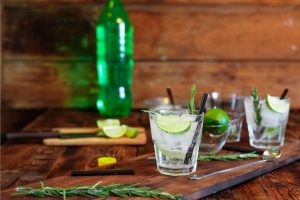
However, if you are at a party and are offered a sweet cocktail, mulled wine, or a glass of red wine or champagne, I recommend the red wine or champagne, for their antioxidants, every time. Sip slowly and enjoy each delicious mouthful.
I always recommend you steer clear of sugary alcoholic drinks because they produce the worst hangovers!
Some sweet alcoholic beverages play havoc with your blood sugar levels and induce cravings while drinking them, which can have you reaching for snacks that may disrupt your gut health.
Sugar in alcohol gives you a buzz, but the come-down the next day and the dehydration are why you feel dreadful. Plus, the a lack of good sleep, hormone disruption, etc.
For more information about what happens when you drink alcohol, read the articles: How to Avoid a Hangover, How to Deal With a Hangover, & Best Alcohol Drinks for Diabetes.
Moderation is key, of course, because in large amounts, alcohol will cause gut dysbiosis, which is when your balanced gut bacteria is disrupted.
This compromises the immune system, leads to bacterial overgrowth and leaky gut syndrome, and can damage other organs.
It can also make you feel the opposite of jolly because of the brain-gut connection. Too much alcohol can lead to depression.
Liver health is also imperative to good health, as an overtaxed liver makes you feel unwell. Alcohol interferes with the liver’s ability to break down and remove fats.
Also, excess alcohol can strip the body of essential minerals and can further contribute to chronic disease.
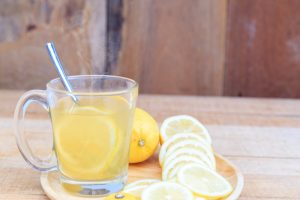
Drink lots of warm lemon water between your social occasions to support your liver health, and try to have a few days alcohol-free, if possible.
Members, be prepared! Here’s a detailed Overindulgence Recovery Protocol.
Support your liver through the festive period by following the liver detox section.
Festive Food to Keep Gut Healthy
Traditional holiday foods like meat and vegetables that are prepared simply will do you good since they will populate your microbiome with some excellent bacteria.
For instance, many traditional feast vegetables will have a prebiotic effect. Prebiotics stimulate health-promoting bacteria in the gut microbiome.
As a prebiotic example, carrot fiber is a good fuel source for the bacteria Bifidobacterium longum, Bifidobacterium adolescentis, and many more residing in the gut.
This bacteria produces short-chain fatty acids, contributing to good gut health, increased barrier integrity, decreased inflammation markers, and overall health.
The amount and type of fiber you eat affect the composition of gut bacteria and what short-chain fatty acids are produced.
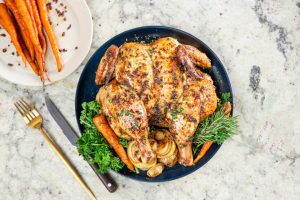
Nutrition in traditional and straightforward vegetables served at holiday times is essential for health.
For instance, the carrot is a gold mine of nutrition. It is rich in vitamins, polyphenols, and carotenoids, acting as antioxidants, anti-cancer, and immune boosting.
They are suitable for a healthy heart and lungs, cholesterol-lowering, collagen production, eyesight, skin, nails, wound healing, and anti-inflammatory.
Nutrients in various types of organic meat will also provide bioavailable (easily absorbed) protein, minerals, and vitamins, aiding the body in building and repairing tissue, maintaining healthy skin and hair, and boosting immunity, a healthy nervous system, thyroid health, metabolic balance, red blood cells, and cholesterol health. Plus, beneficial gut bacteria.
For lots of holiday feasts, there are a lot of baked and sweet goods that may contribute to an unhealthy gut.
Try these: Gut-healthy Thanksgiving Recipes, 5 Acid Reflux-friendly Desserts, Gut-friendly Festive Recipes, and Best Appetizer Recipes to Suit Everyone.
I suggest baking your cakes, cookies, and bread using anti-inflammatory ingredients. You will know what they contain and will satisfy your sweet tooth for longer without compromising your health.
Eating predominantly well means that it is okay to have the odd chocolate candy being passed around because you will be full of nutrition.
For the buffet table or to know which canapés to go for, Members consult the Eating Out Guide.
Interestingly, it doesn’t take long to train your tastebuds, nor reduce the microbiota that craves unhealthy food and increase the microbiota that craves healthy, anti-inflammatory foods.
Food is one of the most critical modifying factors of the microbiota-gut-brain axis.
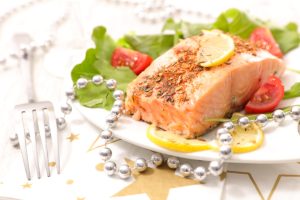
As Dr. Dawn Sherling said in our recent podcast about additives and the microbiome, reclaiming the joy in food and eating well is excellent advice.
Enjoying good food is essential to good gut health, liver health, immunity, neurotransmitter production, and keeping inflammation down.
Food is life; it is beautiful, and it significantly affects how we feel.
Does Exercise Reduce Inflammation?
It’s wonderful to rest, read, play board games, watch films, and have time with your family over the holidays. Remember to move every day, though. You will feel better for it.
Being sedentary increases inflammation and is a significant risk factor for chronic conditions.
Stretch out your fascia and fit in a quick anti-inflammatory workout before you start the day, focusing on your core for good gut health. The Eat Burn Sleep movements are manageable and show results quickly without increasing inflammation (many exercises can cause chronic inflammation). Being sustainable helps mental and physical health.
Even a short walk twice daily will benefit you over the holidays.
Gut microbiota loses diversity, and disease risk increases with a sedentary lifestyle.

Can Holiday Stress Affect Gut Health?
Holiday stress is real, and in particular, if you are suffering from chronic diseases like inflammatory bowel disease such as colitis and Crohn’s, PCOS, and endometriosis, with flare-ups that are challenging throughout the year, let alone having to navigate the holidays, too.
Unfortunately, stress does affect your microbiome, which can increase the symptoms and conditions.
Excess cortisol alters microbial diversity and composition, and good microbiota regulates stress response and hormones.
The gut-brain axis aids in reducing stress. A well-balanced gut will deal with stress more efficiently.
Stressful interventions induce changes in the gut, so make sure you socialize with people who do not stress you out, for instance.
Physical interactions with people you love to be with promote an abundance of good microbiota.
Keeping stress down will promote a balanced microbiome, gut motility, digestion, immunity, healthier liver, neurotransmitter production, and aid sleep.
Whatever healthy things you can do to reduce stress, do them as much as possible between festivities. Make time for yourself.
Check out How Do You Live With IBS & Anxiety?, & Depression Diet & Lifestyle Intervention.
Members, you have full access to the potent tools to aid in de-stressing throughout the platform under Membership, like the Mental Wellness section, Movement Guide, Lifestyle Guide, etc.

Sleep and Gut Health
A lot of late nights in succession will take its toll. I always advocate for early nights rather than late ones.
There’s nothing nicer than an evening meditation, a warm bath, and snuggling up early with a good book with my phone in another room.
However, I know there are dinners, party invitations, family gatherings, and visitors, so I suggest taking alternate early nights over the festive season and getting back on track as soon as possible.
Sleep deprivation does so much damage and will zap your energy levels. It changes gut microbes, dysregulates hormones, compromises your immune system, increases inflammation, puts your body at risk of chronic disease, puts weight on, and so on.
You can read more about what happens during sleep in this article: Top Tips for Better Sleep, Weight Loss & The Link With Sleep.
You can also retrain your sleeping patterns with Eat Burn Sleep because a healthy gut microbiome influences your sleep quality. There’s a Personalized Advice for Insomnia for anyone needing extra help.
Microbiome diversity promotes more restorative sleep in the long term. Sleep is precious and imperative to good health.

Looking After Your Gut Microbiome
Looking after your gut microbiome will aid you in navigating the holiday season with vitality and joy.
It’s a scientific fact that you are more likely to feel naturally jolly if your gut bacteria is balanced.
Remember that what you eat, how you move, what you think, breathe, and how you sleep all contribute to your health.
Be kind to yourself and look after yourself, and remember that it is not about perfection. It is about damage limitation.
Whichever holiday you celebrate this month, I hope you enjoy it.

